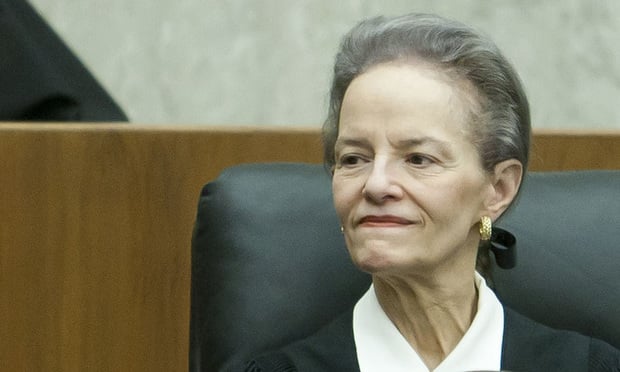DC Circuit Again Rejects Attorney's Push to Get More Info on Trump's Financial Disclosure Form
In tossing attorney Jeffrey Lovitky's lawsuit, the panel said he "has highlighted a potential for mischief."
February 11, 2020 at 12:11 PM
4 minute read
 D.C. Circuit Judge Judith Rogers. (Photo: Diego M. Radzinschi / ALM)
D.C. Circuit Judge Judith Rogers. (Photo: Diego M. Radzinschi / ALM)
The U.S. Court of Appeals for the D.C. Circuit has again rejected an attorney's effort to get President Donald Trump to provide more information on his financial disclosure form.
Attorney Jeffrey Lovitky has spent several years in D.C. federal court challenging Trump's financial disclosure reports filed with the Office of Government Ethics. The D.C. Circuit initially ruled against him in 2019, finding it couldn't order the president to amend forms he filed as a candidate.
Lovitky sued again in 2019, over Trump's 2018 and 2019 financial disclosure forms. He argued that, because the president's personal and corporate liabilities are not differentiated on the form, it prevents him from being able to determine whether Trump has any potential conflicts of interests and harms him as a voter.
In a unanimous opinion on Tuesday, Judge Judith Rogers repeatedly referred to the D.C. Circuit's prior ruling against Lovitky, writing: "Just like in Lovitky's prior appeal, the court begins—and ends—its analysis with subject matter jurisdiction, holding that Lovitky 'lacks the clear right to relief based on a clear duty to act that is necessary to obtain mandamus relief.'"
Rogers, in the opinion joined by Judge Patria Millett and Senior Judge A. Raymond Randolph, said in order to advance the case, Lovitky "must have plausibly alleged that the Ethics Act, once interpreted, imposed a clear and indisputable duty on President Trump to differentiate personal from business liabilities."
However, the opinion notes that the Ethics in Government Act, which Lovitky alleged Trump was violating, does not block filers from providing more information than required, as Trump had on his form.
"Given the threat of civil penalties and criminal prosecution, a cautious filer, or one with complicated financial holdings, may want to err on the side of over-disclosure. In addition, there are plausible reasons why Congress may have written the statute to not forbid, or at least allow, inclusion of liabilities that are not required to be disclosed," the opinion reads.
The opinion did acknowledge that there may be potential issues with the act, after the court presented a hypothetical during oral arguments in December on what would happen if an individual included the liabilities of friends and family on the form "to willfully obscure the debts the statute requires to be disclosed."
"The court need not resolve how it would handle this hypothetical situation, however, because Lovitky has not alleged that it is presented here. But Lovitky has highlighted a potential for mischief," the opinion reads. "Although the courts lack jurisdiction to order the relief Lovitky seeks, he may, of course, use the political process to press for legislative or regulatory reforms."
Lovitky said after Tuesday's ruling that he was "quite disappointed that the court did not address the standing issue. I thought it was something they would have done."
He said he has not made a decision on any future action he might take in the litigation.
Lovitky's lawsuits had raised questions in other cases against the president about the kinds of legal challenges Trump could face while in office.
U.S. District Judge Colleen Kollar-Kotelly had stayed in August a lawsuit against Trump by ex-White House aide Cliff Sims until the D.C. Circuit ruled in Lovitky's case or Democratic lawmaker's Emoluments Clause lawsuit against Trump. But the Sims lawsuit was dismissed at the parties' request in December, and the D.C. Circuit also threw out the Democrats' challenge last week.
This content has been archived. It is available through our partners, LexisNexis® and Bloomberg Law.
To view this content, please continue to their sites.
Not a Lexis Subscriber?
Subscribe Now
Not a Bloomberg Law Subscriber?
Subscribe Now
NOT FOR REPRINT
© 2025 ALM Global, LLC, All Rights Reserved. Request academic re-use from www.copyright.com. All other uses, submit a request to [email protected]. For more information visit Asset & Logo Licensing.
You Might Like
View All
Trump's DOJ Delays Releasing Jan. 6 FBI Agents List Under Consent Order
3 minute read
Judge Grills DOJ on Trump’s Birthright Citizenship Executive Order

Perkins Coie Backs Challenge to Trump's Ban on Transgender Military Service
4 minute read
Selendy Gay Files Lawsuit Challenging Trump's Workforce Reclassification EO
2 minute readTrending Stories
- 1'Translate Across Disciplines': Paul Hastings’ New Tech Transactions Leader
- 2Milbank’s Revenue and Profits Surge Following Demand Increases Across the Board
- 3Fourth Quarter Growth in Demand and Worked Rates Coincided with Countercyclical Dip, New Report Indicates
- 4Public Notices/Calendars
- 5Monday Newspaper
Who Got The Work
J. Brugh Lower of Gibbons has entered an appearance for industrial equipment supplier Devco Corporation in a pending trademark infringement lawsuit. The suit, accusing the defendant of selling knock-off Graco products, was filed Dec. 18 in New Jersey District Court by Rivkin Radler on behalf of Graco Inc. and Graco Minnesota. The case, assigned to U.S. District Judge Zahid N. Quraishi, is 3:24-cv-11294, Graco Inc. et al v. Devco Corporation.
Who Got The Work
Rebecca Maller-Stein and Kent A. Yalowitz of Arnold & Porter Kaye Scholer have entered their appearances for Hanaco Venture Capital and its executives, Lior Prosor and David Frankel, in a pending securities lawsuit. The action, filed on Dec. 24 in New York Southern District Court by Zell, Aron & Co. on behalf of Goldeneye Advisors, accuses the defendants of negligently and fraudulently managing the plaintiff's $1 million investment. The case, assigned to U.S. District Judge Vernon S. Broderick, is 1:24-cv-09918, Goldeneye Advisors, LLC v. Hanaco Venture Capital, Ltd. et al.
Who Got The Work
Attorneys from A&O Shearman has stepped in as defense counsel for Toronto-Dominion Bank and other defendants in a pending securities class action. The suit, filed Dec. 11 in New York Southern District Court by Bleichmar Fonti & Auld, accuses the defendants of concealing the bank's 'pervasive' deficiencies in regards to its compliance with the Bank Secrecy Act and the quality of its anti-money laundering controls. The case, assigned to U.S. District Judge Arun Subramanian, is 1:24-cv-09445, Gonzalez v. The Toronto-Dominion Bank et al.
Who Got The Work
Crown Castle International, a Pennsylvania company providing shared communications infrastructure, has turned to Luke D. Wolf of Gordon Rees Scully Mansukhani to fend off a pending breach-of-contract lawsuit. The court action, filed Nov. 25 in Michigan Eastern District Court by Hooper Hathaway PC on behalf of The Town Residences LLC, accuses Crown Castle of failing to transfer approximately $30,000 in utility payments from T-Mobile in breach of a roof-top lease and assignment agreement. The case, assigned to U.S. District Judge Susan K. Declercq, is 2:24-cv-13131, The Town Residences LLC v. T-Mobile US, Inc. et al.
Who Got The Work
Wilfred P. Coronato and Daniel M. Schwartz of McCarter & English have stepped in as defense counsel to Electrolux Home Products Inc. in a pending product liability lawsuit. The court action, filed Nov. 26 in New York Eastern District Court by Poulos Lopiccolo PC and Nagel Rice LLP on behalf of David Stern, alleges that the defendant's refrigerators’ drawers and shelving repeatedly break and fall apart within months after purchase. The case, assigned to U.S. District Judge Joan M. Azrack, is 2:24-cv-08204, Stern v. Electrolux Home Products, Inc.
Featured Firms
Law Offices of Gary Martin Hays & Associates, P.C.
(470) 294-1674
Law Offices of Mark E. Salomone
(857) 444-6468
Smith & Hassler
(713) 739-1250








